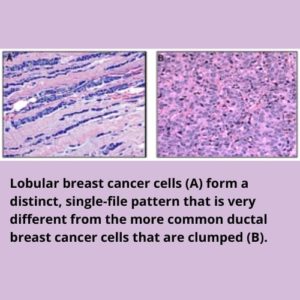This National Breast Cancer Awareness Month, the Lobular Breast Cancer Alliance is accelerating its efforts to make all who are touched by invasive lobular carcinoma (ILC), also known as lobular breast cancer, aware of its unique characteristics and the critical need for more ILC research.
The Sneaky Breast Cancer

ILC is known as the sneaky type of breast cancer. It’s often harder to detect with standard imaging because ILC tumors usually grow in lines and don’t clump. And in some cases, ILC tumors become resistant to the standard breast cancer treatments and recur for reasons that are not yet understood. Unfortunately, despite all of the ways that ILC behaves differently, there hasn’t been enough research to determine that ILC should be treated differently and what treatments might work better for ILC. In fact, many people don’t even know that breast cancer has subtypes, let alone anything about lobular breast cancer.
Our New Campaign
LBCA believes one way to raise awareness about the existence of the ILC subtype — and how it is different — is to get people talking about breast cancer subtypes and curious about ILC. That’s why we’re kicking off the “It’s not just breast cancer, it’s lobular breast cancer” campaign. Using this simple sentence, and the hashtags #IHaveLOBULARBreastCancer or #IHadLOBULARBreastCancer, we intend to stimulate more conversations about breast cancer subtypes and inquiries about ILC and why it needs more research.
How You Can Help
The LBCA encourages those affected by ILC to start using this phrase and hashtags when speaking to peers, clinicians, or online about lobular breast cancer. This will help start making lobular breast cancer and its differences stand out. In addition, LBCA’s website contains many resources that can be used to educate others about ILC and how all breast cancer is not the same. Learn additional ways to educate others about this different type of breast cancer by visiting our Advocacy through Education page.
Another way to help advance understanding about ILC is through research advocacy. Research advocates strive to raise awareness about ILC and how it is different by becoming involved in research grant development and/or review, or in conversations with researchers and scientists and promoting study of ILC specifically. Learn more about research advocacy and how to become involved by exploring our Research Advocacy Toolkit page. Join us starting now in helping everyone understand that lobular breast cancer is different and needs to be better studied.

